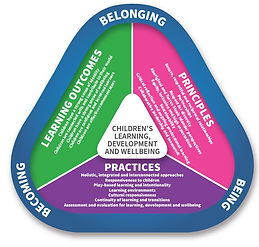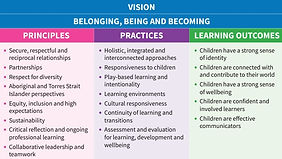Watch Me Grow Early Learning Centre
wantirna@watchmegrow.com.au | (03) 9801 2676
1 Alderford Drive, Wantirna, Victoria 3152
NATIONAL QUALITY STANDARD
EARLY YEARS LEARNING FRAMEWORK
Programming and Planning In Childcare
- information from ACECQA.GOV.AU

NATIONAL QUALITY STANDARD
The National Quality Standard (NQS) sets a high national benchmark for early childhood education and care and outside school hours care services in Australia.
The NQS includes 7 quality areas that are important outcomes for children.
Services are assessed and rated by their regulatory authority against the NQS, and given a rating for each of the 7 quality areas and an overall rating based on these results.
Quality Area 1 – Educational program and practice
Educational program and practice of educators are child-centred, stimulating and maximise opportunities for enhancing and extending each child’s learning and development.
Quality Area 2 – Children's health and safety
Children have the right to experience quality education and care in an environment that safeguards and promotes their health, safety and wellbeing.
Quality Area 3 – Physical environment
Physical environment is safe, suitable and provides a rich and diverse range of experiences that promote children’s learning and development.
Quality Area 4 – Staffing arrangements
Qualified and experienced educators, who develop warm, respectful relationships with children, create predictable environments and encourage children’s active engagement in the learning program.
Quality Area 5 – Relationships with children
Relationships with children are responsive, respectful and promote children’s sense of security and belonging.
Quality Area 6 – Collaborative partnerships with families and communities
Collaborative relationships with families are fundamental to achieving quality outcomes for children, and community partnerships based on active communication, consultation and collaboration are essential.
Quality Area 7 – Governance and leadership
Effective leadership and governance of the service contributes to quality environments for children’s learning and development. Effective leaders establish shared values for the service and set clear direction for the service’s continuous improvement.

RATING ISSUED: February 2023
BELONGING, BEING & BECOMING
All children experience learning that is engaging and builds success for life. Fundamental to the Framework is a view of children’s lives as characterised by belonging, being and becoming. From before birth children are connected to family, community, culture and place. Their earliest development and learning takes place through these relationships, particularly within families, who are children’s first and most influential educators. As children participate in everyday life, they develop interests and construct their own identities and understandings of the world.
BELONGING
Experiencing belonging – knowing where and with whom you belong – is integral to human existence. Children belong first to a family, a cultural group, a neighbourhood and a wider community. Belonging acknowledges children’s interdependence with others and the basis of relationships in defining identities. In early childhood, and throughout life, relationships are crucial to a sense of belonging. Belonging is central to being and becoming in that it shapes who children are and who they can become.
BEING
Childhood is a time to be, to seek and make meaning of the world. Being recognises the significance of the here and now in children’s lives. It is about the present and them knowing themselves, building and maintaining relationships with others, engaging with life’s joys and complexities, and meeting challenges in everyday life. The early childhood years are not solely preparation for the future but also about the present.
BECOMING
Children’s identities, knowledge, understandings, capacities, skills and relationships change during childhood. They are shaped by many different events and circumstances. Becoming reflects this process of rapid and significant change that occurs in the early years as young children learn and grow. It emphasises learning to participate fully and actively in society.


THE EARLY YEARS LEARNING FRAMEWORK
Within Australia, Programming and Planning is reflected and supported by the Early Years Learning Framework (EYLF). The Framework conveys the highest expectations for all children’s learning from birth to five years and through the transitions to school. It communicates these expectations through the following five Learning Outcomes:
1. Children have a strong sense of identity
-
Children feel safe, secure, and supported
-
Children develop their emerging autonomy, inter-dependence, resilience and sense of agency
-
Children develop knowledgeable and confident self identities and a positive sense of self-worth
-
Children learn to interact in relation to others with care, empathy and respect
2. Children are connected with and contribute to their world
-
Children develop a sense of connectedness to groups and communities and an understanding of their reciprocal rights and responsibilities as active and informed citizens
-
Children respond to diversity with respect
-
Children become aware of fairness
-
Children become socially responsible and show respect for the environment
3. Children have a strong sense of wellbeing
-
Children become strong in their social, emotional and mental wellbeing
-
Children become strong in their physical learning and wellbeing
-
Children are aware of and develop strategies to support their own mental and physical health and personal safety
4. Children are confident and involved learners
-
Children develop a growth mindset and learning dispositions such as curiosity, cooperation, confidence, creativity, commitment, enthusiasm, persistence, imagination and reflexivity
-
Children develop a range of learning and thinking skills and processes such as problem solving, inquiry, experimentation, hypothesising, researching and investigating
-
Children transfer and adapt what they have learned from one context to another
-
Children resource their own learning through connecting with people, place, technologies and natural and processed materials
5. Children are effective communicators
-
Children interact verbally and non-verbally with others for a range of purposes
-
Children engage with a range of texts and gain meaning from these texts
-
Children express ideas and make meaning using a range of media
-
Children begin to understand how symbols and pattern systems work
-
Children use digital technologies and media to access information, investigate ideas and represent their thinking


